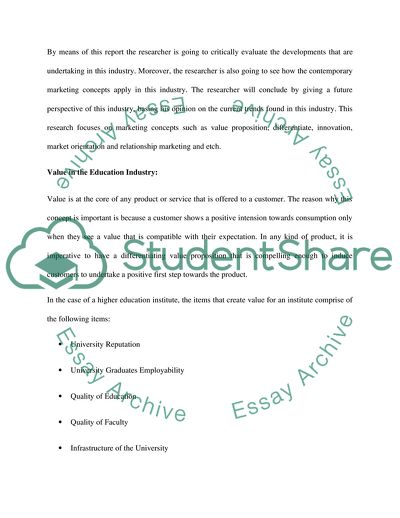Cite this document
(The Role of Marketing Concepts in the Future Provision of Higher Education Coursework Example | Topics and Well Written Essays - 2250 words, n.d.)
The Role of Marketing Concepts in the Future Provision of Higher Education Coursework Example | Topics and Well Written Essays - 2250 words. https://studentshare.org/education/1774368-critically-analyse-and-apply-the-marketing-concepts-covered-in-the-module-which-will-help-you-to-understand-the-future-provision-of-higher-education
The Role of Marketing Concepts in the Future Provision of Higher Education Coursework Example | Topics and Well Written Essays - 2250 words. https://studentshare.org/education/1774368-critically-analyse-and-apply-the-marketing-concepts-covered-in-the-module-which-will-help-you-to-understand-the-future-provision-of-higher-education
(The Role of Marketing Concepts in the Future Provision of Higher Education Coursework Example | Topics and Well Written Essays - 2250 Words)
The Role of Marketing Concepts in the Future Provision of Higher Education Coursework Example | Topics and Well Written Essays - 2250 Words. https://studentshare.org/education/1774368-critically-analyse-and-apply-the-marketing-concepts-covered-in-the-module-which-will-help-you-to-understand-the-future-provision-of-higher-education.
The Role of Marketing Concepts in the Future Provision of Higher Education Coursework Example | Topics and Well Written Essays - 2250 Words. https://studentshare.org/education/1774368-critically-analyse-and-apply-the-marketing-concepts-covered-in-the-module-which-will-help-you-to-understand-the-future-provision-of-higher-education.
“The Role of Marketing Concepts in the Future Provision of Higher Education Coursework Example | Topics and Well Written Essays - 2250 Words”. https://studentshare.org/education/1774368-critically-analyse-and-apply-the-marketing-concepts-covered-in-the-module-which-will-help-you-to-understand-the-future-provision-of-higher-education.


